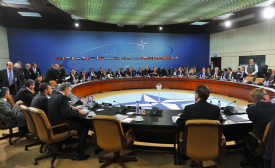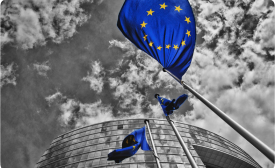european union
U.S. President Barack Obama and European Union leaders presented a unified front Wednesday against Russia’s annexation of Crimea, promoting transatlantic trade as an antidote to Russia’s influence in the region and a way to help Europe become less dependent on Moscow for energy.
When President Obama and European allies meet next week, they can begin forming a meaningful response to Vladimir Putin’s adventurism. This new strategy should note that Putin’s view of the world is rooted in dangerous fictions. Churchill said Russia was a riddle wrapped in a mystery inside an enigma. Under Putin, Russia’s rhetoric can be described as a fantasy inside a delusion wrapped in a tissue of lies.

NATO Secretary General Anders Fogh Rasmussen told a Washington audience on Wednesday that Russia’s absorption of Crimea is a “wake-up call” for his organization. The alarm had best ring loudly, because NATO has been sleeping deeply.
Chancellor Angela Merkel has issued an ultimatum to Russia over what she called its annexation of Crimea: Back down or face strong measures from the European Union. Accusing Moscow of acting by the “law of the jungle” in an address to parliament on Thursday, Merkel said Russian President Vladimir Putin’s actions are a clear breach of international law and threatened full-fledged economic sanctions.
In less than a week, representatives from Iran and the P5+1 (Britain, China, France, Russia, the U.S. plus Germany) will convene in Vienna to discuss ways for Iran to give verifiable guarantees of the solely peaceful nature of its nuclear program.

Michael Reinprecht is European Visiting Fellow at USC School of International Relations for the 2013-2014 academic year. In this conversation with CPD, he will share his experiences as the Head of the Middle East Department in the European Parliament (EP).
Reinprecht discussed the EP’s recent activities in this emerging region and the role of the 750-Members-strong Parliament in its interaction with the EU’s public diplomacy arm, the European External Action Service.
But it's nuts to talk about Ukraine the same way. Putin didn't invade Crimea because the decadent West was aimlessly sunning itself on a warm beach somewhere. He invaded Crimea because America and the EU had been vigorously promoting their interests in a country with deep historical ties to Russia.
Less than a week before Crimea's referendum, emotions are running high. Residents of the southeast Ukrainian peninsula who want to see their region cede from the nation and officially become part of Russia sense victory is round the corner. The U.S. and Europe say the vote -- and the Russian invasion that prompted it -- are illegal, but CBS News' Elizabeth Palmer reports that thousands of pro-Russia demonstrators on the streets of regional capital Sevastopol don't care.







